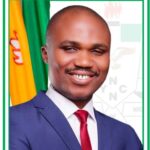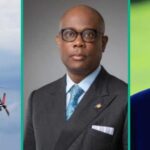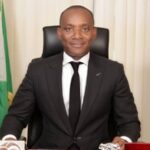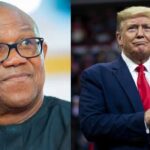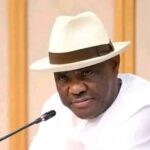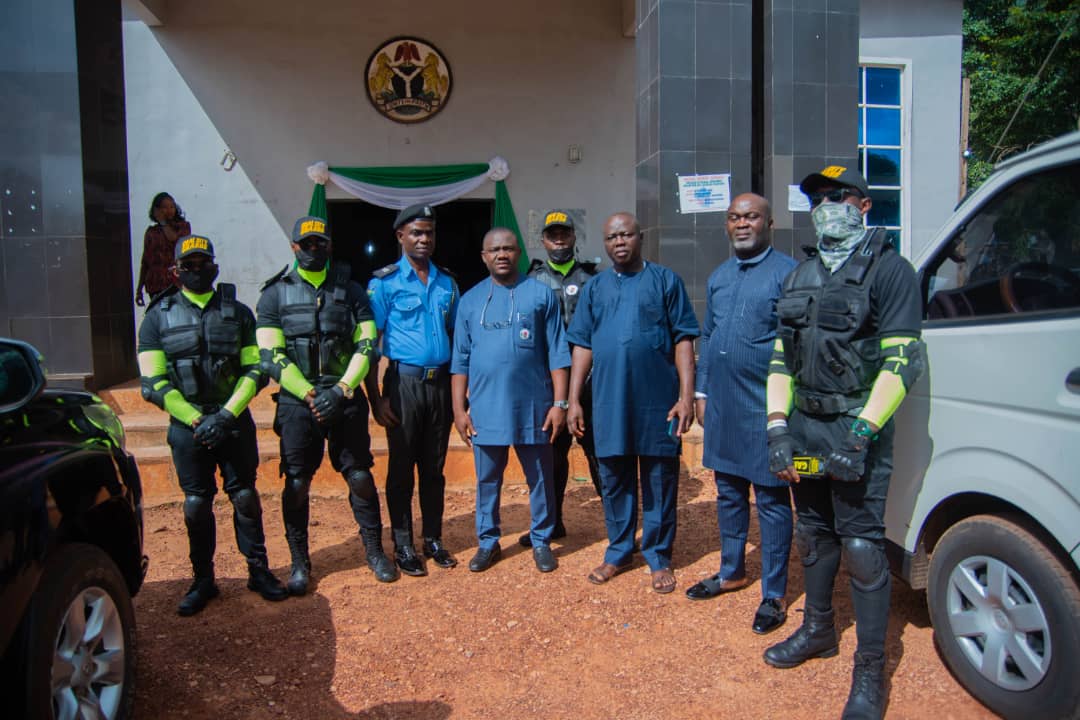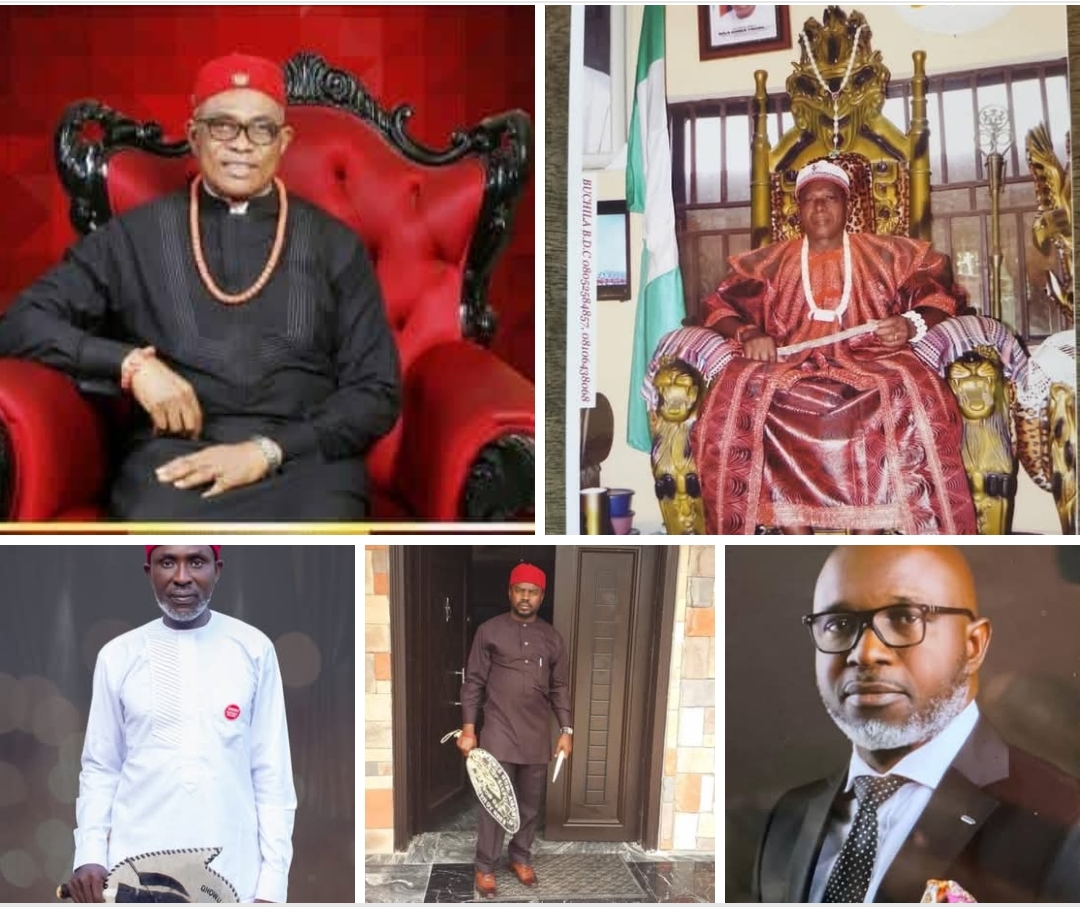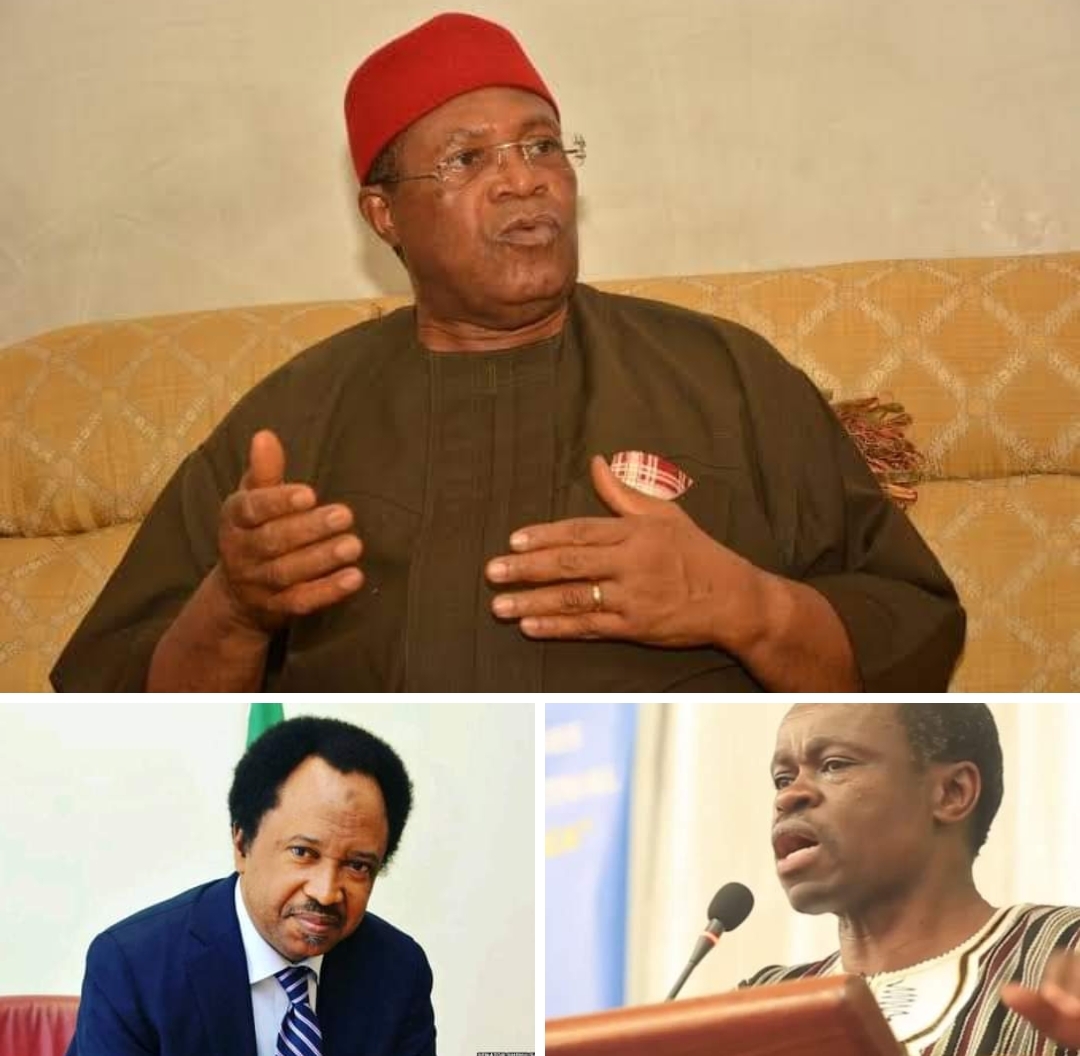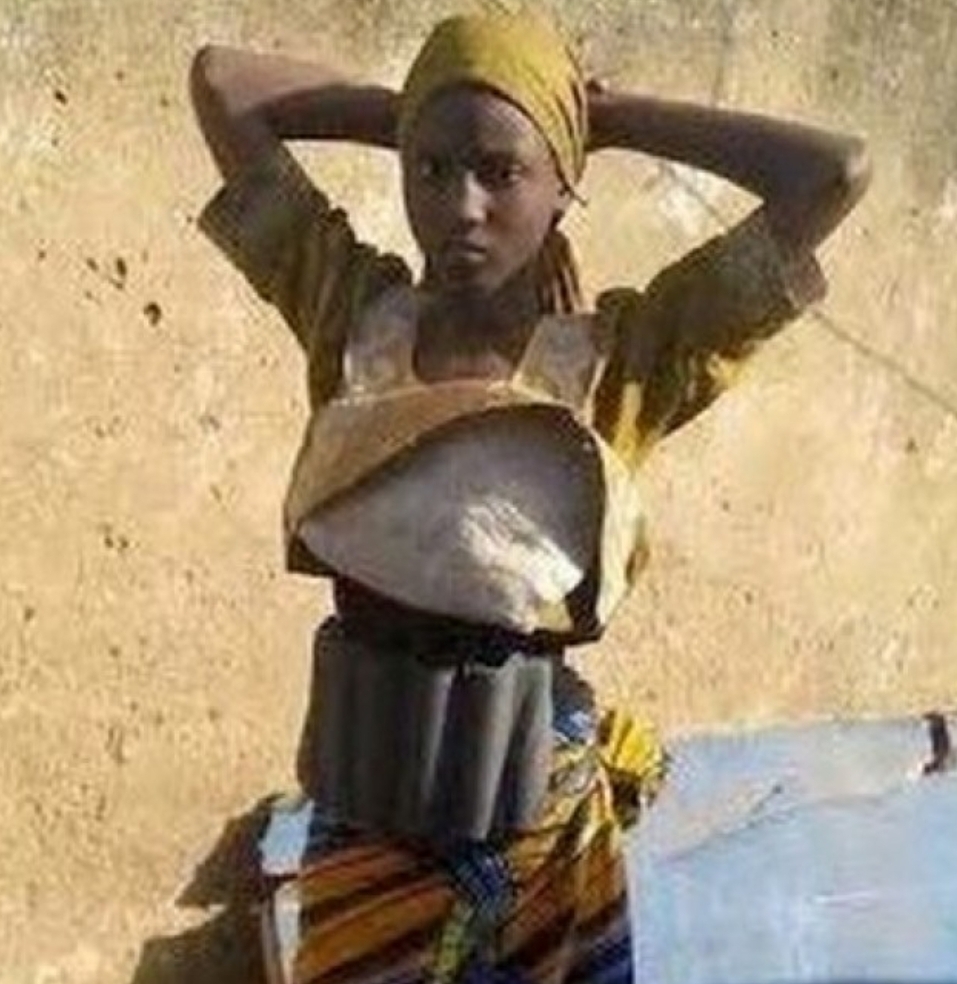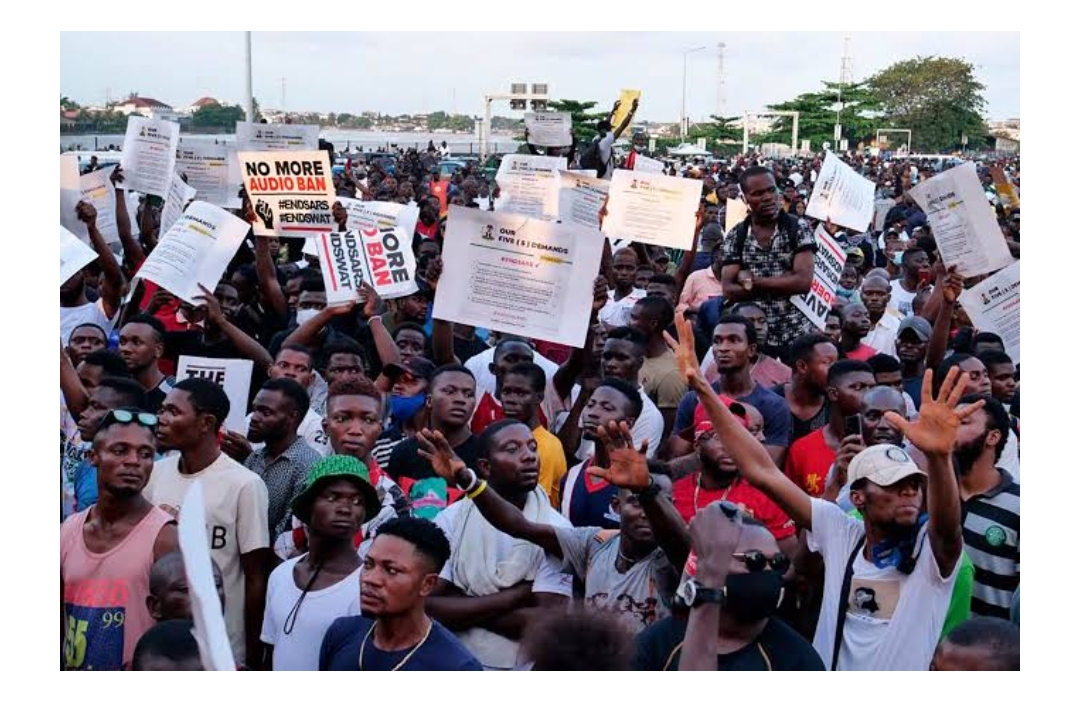Critical stakeholders in Igbo-Eze South and Nsukka Local Government Areas of Enugu state, comprising of government officials and traditional rulers, on Thursday 24th June, converged for the official flag-off of “Ifeanyi Ugwuanyi Leadership Roundtable/Interactive Session” for the sole purpose of sustaining the peaceful atmosphere in the state.
The program which took place at Adada Hall in Nsukka LGA was organized and anchored by Leadership Scorecard Media Company.
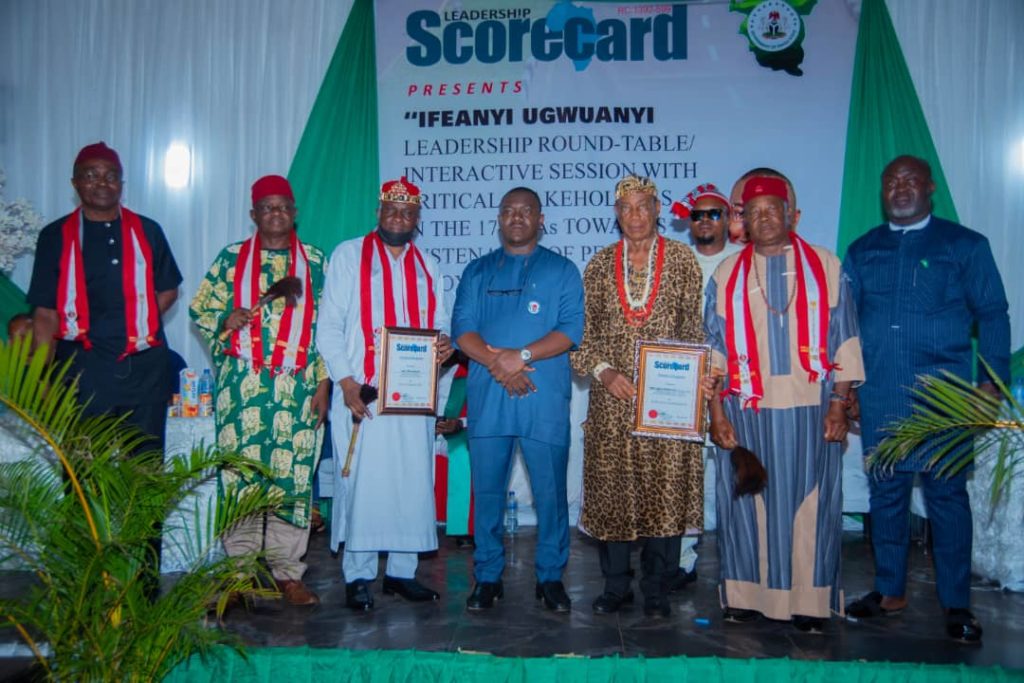
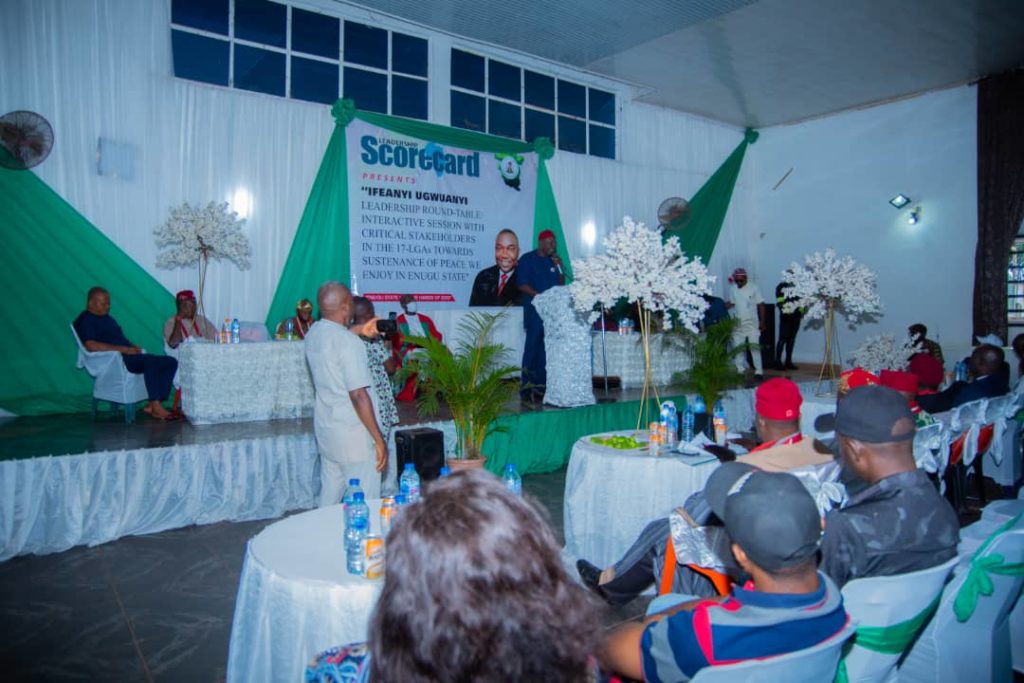
In his welcome address, the Publisher/CEO of Leadership Scorecard Magazine, Hon. Humphrey Onyima, said the meeting was important “for the common purpose of reinstating the endless benefits of peaceful behaviour in the process of individual and collective development.”
While outlining the fact that ‘peaceful engagement breeds development’, Onyima who also doubles as Senior Special Assistant to the governor on Media and Public Affairs, noted that “as our socio-political system continue to evolve, the principles of political leadership, human capital development, infrastructural development, internal security, justice, fairness, tolerance, peace, progress and economic growth become necessary and must inter-twine, mingle and romance as parts of a whole, in order to bring about massive development in all facets.”
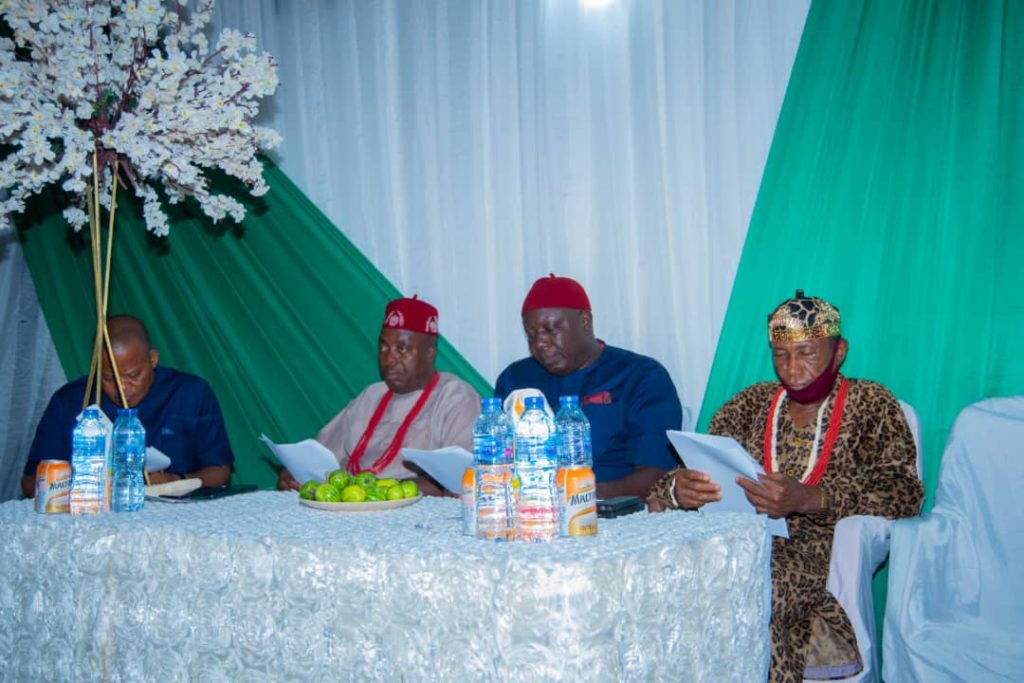
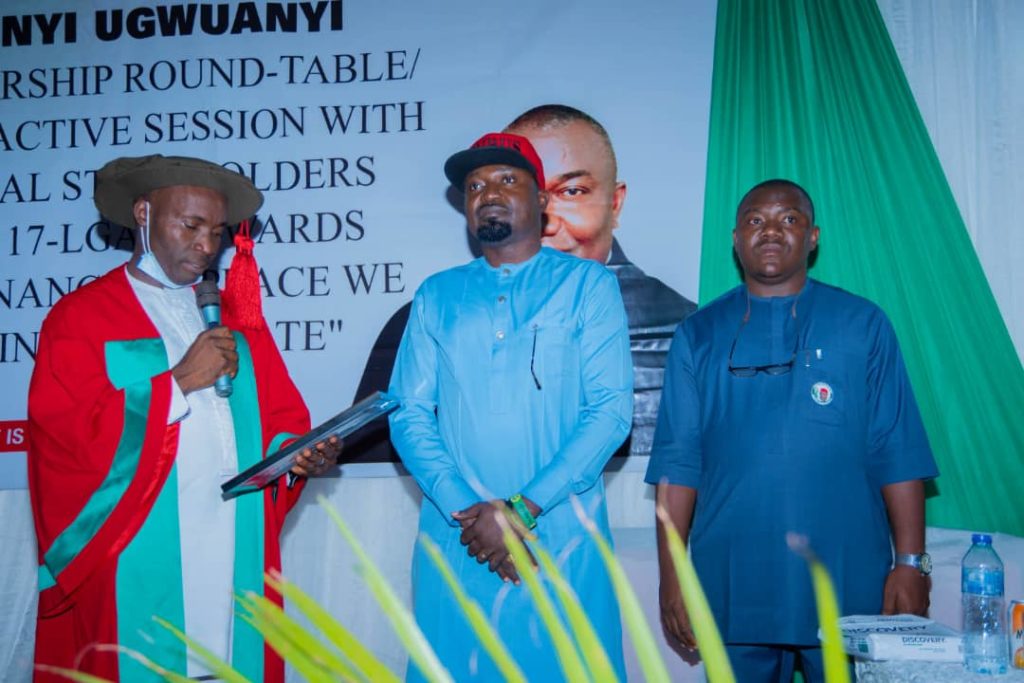
He pointed out that Nigeria having adopted the democratic system of governance in 1999, was still finding it difficult to extricate herself from the long, oppressive military rule and has consciously or unconsciously failed to utilize the opportunity of democracy and independence to engender “sustainable nation building and development through astute leadership and integration of ideas.”
He added that: “The structure inherited by our founding fathers from the colonialists has this far created and promoted a demon once described by late Dim Chukwuemeka Odumegwu Ojukwu as dichotomy.
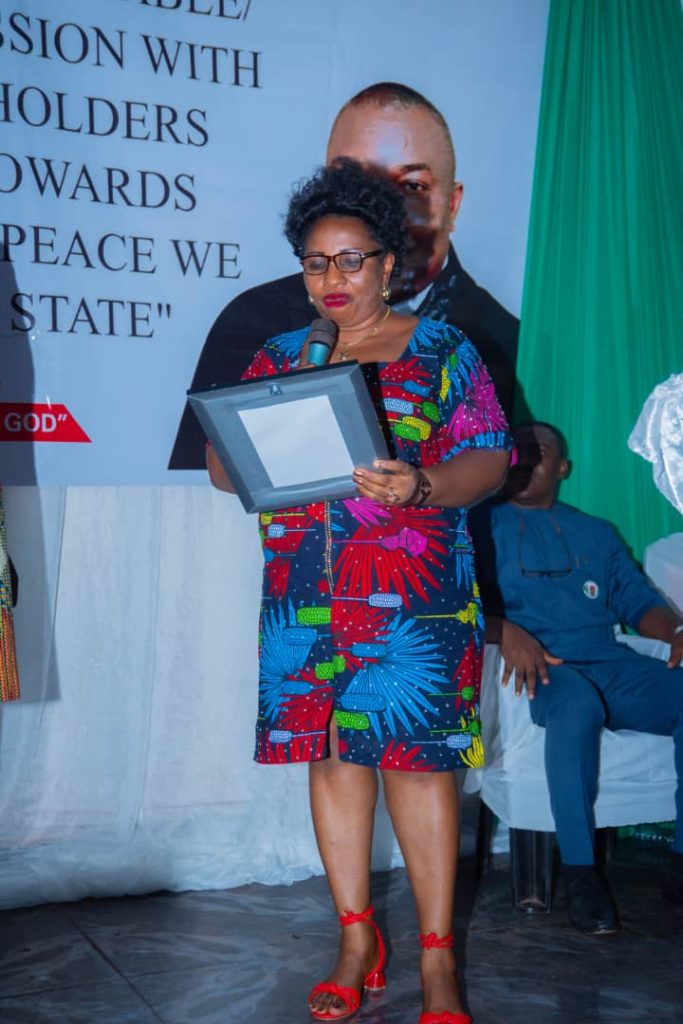
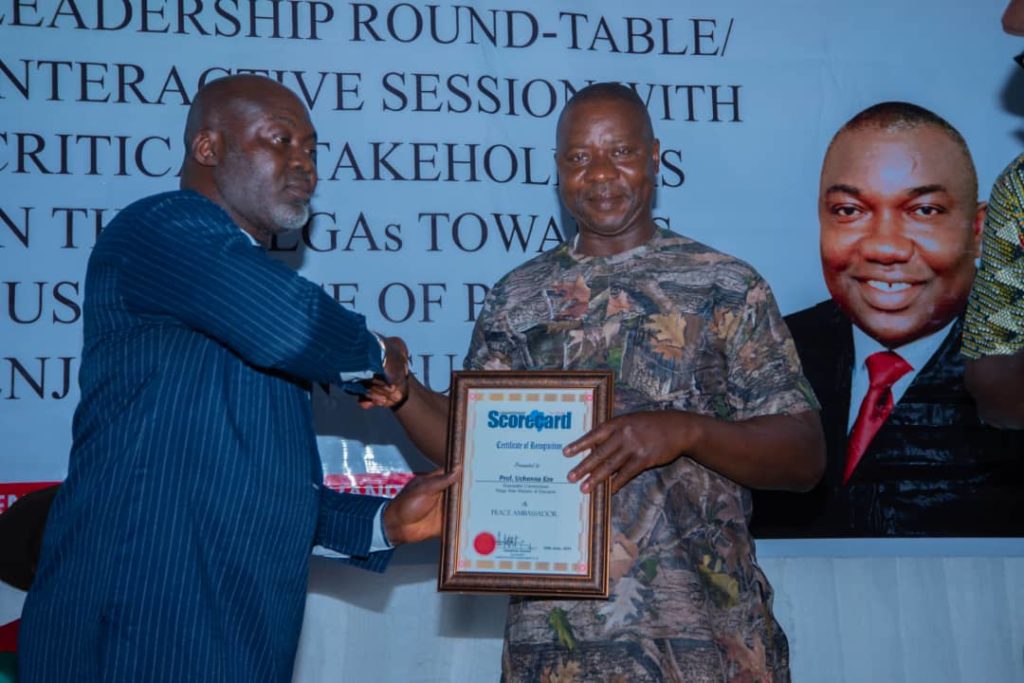
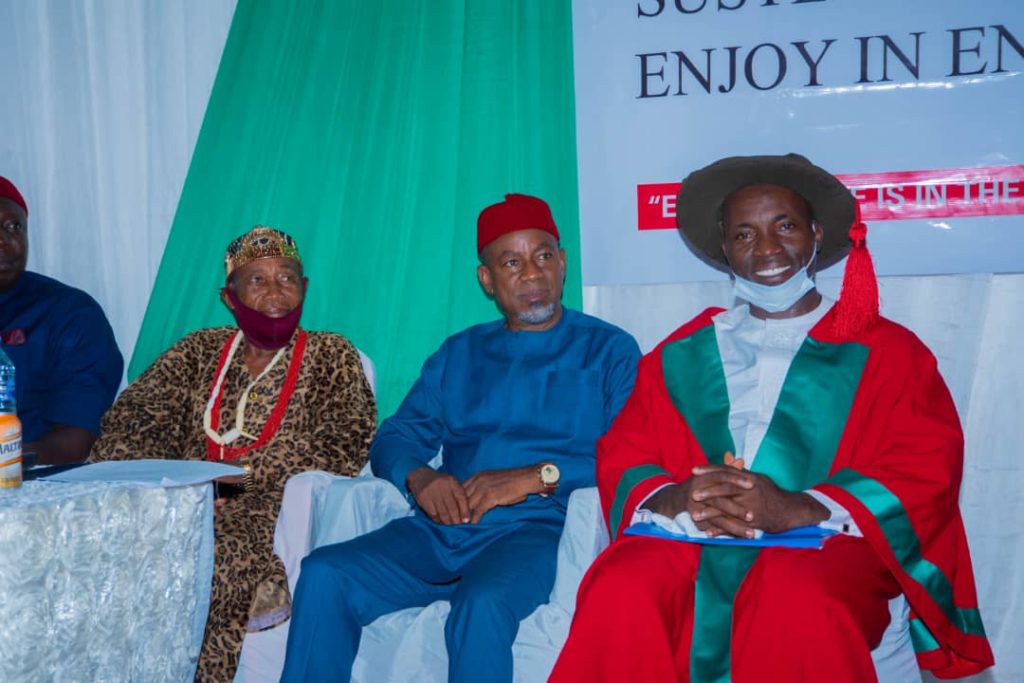
“We live in a country in search of common character; and the absence of the common character is at the base of our problems as a nation.
“Today, when we look at Nigeria from whatever direction, no matter the focus of our perspective, everything bears the frightful aspect of the dichotomy. It is either you see North/South dichotomy or East/West dichotomy. If it is not Majority/Minority dichotomy; it will be Christian/Muslim dichotomy or Socialist/Capitalist dichotomy. If you look further, you will notice an alarming Rich/Poor dichotomy, Educated/Non-educated dichotomy, Tribal/Cultural dichotomy, Male/Female dichotomy, Youth/Old dichotomy, Rural/Urban dichotomy, and it goes on and on.”
Onyima, however, said that such dichotomies does not exist in Enugu state, adding that “such dichotomies was evacuated, exterminated, eliminated, eradicated and decimated by the peace-loving, gentle, humble, calm and youth-friendly Governor of Enugu State, Rt. Hon. Ifeanyi Ugwuanyi.”
He described the governor as an apostle of peace, adding that “where good men are scarce, strife and disorder rule. You cannot have peace without someone placing his personal time, resources and comfort as burnt offering on the slab for what every other person enjoys. Justice, fairness and equity are the factors responsible for the peace we enjoy in Enugu state.”
He concluded that Ifeanyi Ugwuanyi Leadership Roundtable/Interactive Sessions with Critical Stakeholders across the 17 LGAs of the state shall seek to promote factors responsible for the peace being enjoyed by citizens of state.
Presenting a paper on “Sustenance of Peace We Enjoy In Enugu,” the Guest Speaker and Dean of Student Affairs, University of Nigeria, Nsukka, Prof. Edwin Omeje, highlighted the attributes of peaceful leadership to include truthfulness, responsibility, accountability, loyalty, self-awareness, impression management, vision, assertiveness, tolerance and the fear of God.
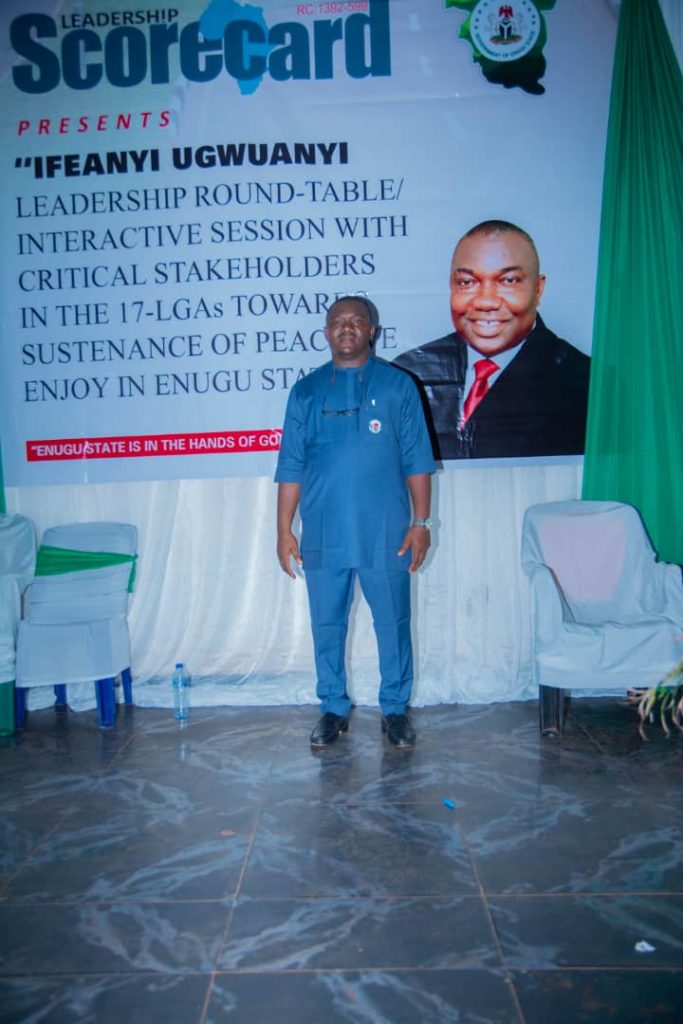
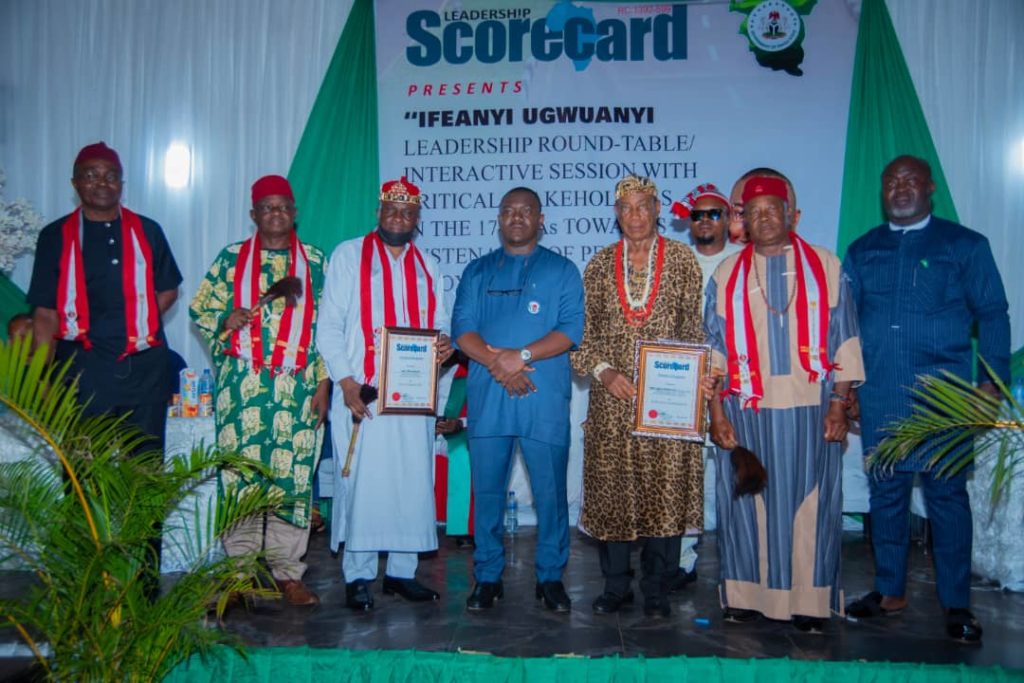
He noted that “peaceful leaders are characterized by having inclusive means of operating, participatory systems that bring the governed into the process of decision making, systems for accountability that ensure transparent and equitable operations, and enough systemic capacity that they are able to provide physical security and public goods supporting human development. When all these elements are present, they form a mutually reinforcing virtuous cycle that reduce the risk of violence.”
He further stated that democracy serves as a political emancipation of the people and as an idea that enables the emergence of servant leaders who are willing to feel the socio-economic and cultural pulse of the people.
“This political surgery or emancipation is systematically patterned and occasioned in order to achieve a lasting relieve of the people to enhance their welfare and create a developed human society,” he stressed.
Omeje pointed out that Governor Ugwuanyi at his emergence to pilot the affairs of the state in 2015 and 2019, made a careful articulation of the needs of his people which was hinged in a focused 4-point agenda of employment generation, social service and good governance, rural development, security and social justice.
“With the above areas of focus, the Governor Ugwuanyi administration engaged on expansive distribution of good governance across the state using the main 4-point agenda which clearly indicates a good understanding of building sustainable democratic tenants which culminated into the people’s needs. The state government is pragmatically forward with sustained pursuit of these agenda,” he said.
He further explained what he referred to as the “Gburugburu model” in peace building and consolidating democratic governance, put in place by Ugwuanyi’s administration to ensure political and economic wellbeing of the residents.
Omeje stressed that the measures of community policing, establishment of vigilante/neighbourhood watch groups, ethno-religious conflict management, grassroot democracy, improved economy via foreign direct investment were some of the measures employed by Ugwuanyi’s government to further engender peace and order in the state.
“Governor Ifeanyi Ugwuanyi’s peaceful governance approach in Enugu has continued to support inclusive development and security in Enugu. Following the successes of the governor’s leadership model, we conclude that the entire leadership of the Southeast and Nigeria in general should emulate the peaceful socio-economic and political governance model of Governor Ugwuanyi to build a sustainable economic and political system,” he concluded.
The Chairman of the occasion, Hon. Chinedu Nwamba PhD, in his opening remarks thanked Leadership SCORECARD (the organizers of the event) for their commitment and support to the Government of Enugu State. He further reiterated the need for cooperation among all relevant stakeholders in sustening the legacy of peace instilled by Gov. Ifeanyi Ugwuanyi’s administration into the Socio-Political atmosphere of Enugu State.
The Chief Host of the event, Hon. Barr. Cosmas Ugwueze, the Council Chairman of Nsukka LGA ably represented by the Deputy Chairman of the Council, Chief Barr. Walter Ozioko extolled Gov. Ugwuanyi’s uncommon peaceful administration in Enugu State.
Climax of the event was the presentation of certificates of recognition to the Special Guests of Honour as Outstanding Icons of Peace, namely Rt. Hon. Dr. Pat Asadu, member representing Nsukka/Igbo-Eze South Federal Constituency at the National Assembly Abuja, Chief Ikeje Asogwa, the Executive Chairman of Enugu State Universal Basic Education Board (ENSUBEB), Chief Engr. Vita Abba, the former Chairman of Peoples Democratic Party in Enugu State, Dr. Dan Shere, former Secretary to the Enugu State Government.
The certificates of recognition as Peace-Ambassadors was conferred on the Chairman of the occasion, Hon. Chinedu Nwamba PhD, member representing Nsukka East State Constituency in the Enugu State House of Assembly, the Chief Host – Hon. Cosmas Ugwueze, the Council Chairman of Nsukka LGA and the Guests of Honour, namely Hon. Dr. Emmanuel Ugwuerua, member representing Nsukka West State constituency, Hon. Emeka Mmadu, member representing Igbo-Eze South State Constituency, Sir. R.U Odo – the State Accountant General.
The certificates of recognition as Royal Peace Ambassadors was bestowed on His Royal Highness, Igwe A.O Ochike (Chinyelugo 1 of Lejja) – Chairman Nsukka Traditional Ruler’s Council, HRH Igwe Ike Oke – the Chairman of Igbo-Eze South Traditional Ruler’s Council, High Chief Dr. M.U Agboeze (Ezenacho Ideke) – the Chairman Council of Oha Nsukka and other royal fathers.
Other dignitaries at the event includes, the representative of the Commissioner for Education, Prof. Uchenna Eze, ably represented by Chief Ossai Uchenna – Area Inspector of Education for Nsukka, representatives of Attorney-General of the state, Barr. Miletus Eze and Honorable Commissioner for Housing, Mr. Vitus Okechi amongst other representatives of the Special Guests of Honour and other invited Guests of Honour.
WELCOME ADDRESS BY HON. HUMPHREY ONYIMA – THE CEO OF LEADERSHIP SCORECARD MAGAZINE AT THE FLAG-OFF OF IFEANYI UGWUANYI LEADERSHIP ROUND-TABLE / INTERACTIVE SESSION WITH CRITICAL STAKEHOLDERS AT ADADA HALL IN NSUKKA ON THURSDAY 24TH JUNE, 2021.
Protocols;
I wish to formally welcome you to the Flag-Off of IFEANYI UGWUANYI LEADERSHIP ROUND-TABLE / INTERACTIVE SESSIONS WITH CRITICAL STAKEHOLDERS ACROSS THE 17-LGAs TOWARDS SUSTENANCE OF THE PEACE WE ENJOY IN ENUGU STATE.
The Flag-Off is holding today 24th June, 2021 at Adada Hall in Nsukka LGA with the critical stakeholders of Igbo-Eze South and Nsukka Local Government Areas for the common purpose of reinstating the endless benefits of peaceful behavior in the process of individual and collective development.
“PEACEFUL ENGAGEMENT BREEDS DEVELOPMENT!”
The Leadership Round-Table / Interactive Session today will feature Prof. Edwin Omeje – the Dean of Student Affairs, University of Nigeria Nsukka as the Guest Speaker and shall also identify with reputable ‘ICONS OF PEACE’, Outstanding ‘PEACE AMBASSADORS’ & Indefatigable ‘ROYAL FATHERS’ who are partnering with Gov. Ifeanyi Ugwuanyi’s administration in the building of a New Enugu State of our collective dream.
As our socio-political system continue to evolve, the principles of political leadership, human capital development, infrastructural development, internal security, justice, fairness, tolerance, peace, progress and economic growth become necessary and must inter-twine, mingle and romance as parts of a whole, in order to bring about massive development in all facets.
While leadership has succeeded by playing tremendous roles in the socio-economic and political developments of most nations, we have failed to get ourselves out of a quagmire situation of our own doing. We failed to extricate ourselves from a long, dissatisfying military rule and, even upon attaining our brand of democracy in 1999; we have consciously and unconsciously through our actions and inactions refused to make it a world-acclaimed version or an exemplary one as it ought to be.
One of the reasons Nigerians opted for democracy was the many promises it held; its proclivity towards integral and sustainable nation-building and development through astute leadership and integration of ideas, being one of its bright lights.
But as the state’s Craft of the Nigerian statehood entangles with her failed promising anniversaries, mixed feelings were rife on the part of various schools of thoughts with the deep concerns and reminiscences which include arguments, that for over 60 years of post-independence, the nation had stuck in a precarious state due to her colonial circumstances; while others would contrarily and more discernibly put it cynically, bluntly that the nation is simply what and where she is democratically due to her own delinquent or diligent making of the fortune or misfortune of her Self-Rule; insisting that Mother-Land ought to have fared exceedingly better on the socio-economic and political clime.
Though on a further contrary opinion the structure inherited by our founding fathers from the colonialists has thus far created and promoted a demon once described by late Dim Chukwuemeka Odumegwu Ojukwu as Dichotomy.
We live in a country in search of a common character; and the absence of the common character is at the base of our problems as a nation.
Today when we look at Nigeria – from whatever direction, no matter the focus of our perspective, everything bears the frightful aspect of the dichotomy. It is either North/South dichotomy or East/West Dichotomy. If it is not Majority/Minority Dichotomy; it will be Christian/Muslim Dichotomy or Socialist/Capitalist Dichotomy, if you look further you will notice an alarming Rich/Poor Dichotomy, Educated/Non Educated Dichotomy, Tribal/Cultural Dichotomy, Male/Female Dichotomy, Youth/Old Dichotomy, Rural/Urban Dichotomy, etc, it goes on and on.
But I have a good news for you, in Enugu State, such dichotomies does not exist, such dichotomies was evacuated, exterminated, eliminated, eradicated and decimated by the peace loving, gentle, humble, calm and youth friendly Governor of Enugu State, His Excellency, Rt. Hon. Ifeanyi Ugwuanyi.
The “…Leadership Round-Table / Interactive Sessions will Critical Stakeholder across the 17-LGAs of Enugu State shall examine our position on a precipice, the last bastion of litany of hopes dashed and consider the role of leadership in nation-building, then climaxes it by dwelling on the leadership model of Governor Ifeanyi Ugwuanyi and how best it serves the man on the street.
The Ifeanyi Ugwuanyi Leadership Round-Table / Interactive Sessions with Critical Stakeholders shall seek to promote factors that are responsible for the peace we enjoy in Enugu State.
Gov. Ifeanyi Ugwuanyi is an Apostle of Peace. Where good men are scarce, strife and disorder rule. You cannot have peace without someone placing his personal time, resources and comfort as burnt offering on the slab for what every other person eventually enjoys.
Leadership Scorecard Integrated Media Co Ltd is a media organization that promotes transparency and accountability in governance in forms of innovation, strategy or intellect on a scale and stage that attracts global attention.
Our VISION is to be pacesetters in leadership performance monitoring and evaluation in Africa; with the MISSION to ensure that leaders are accountable for their roles in governance on the continent.
In view of the aforementioned, the Leadership SCORECARD Media Company wishes to partner with the general public through interactive sessions slated to hold across 17-LGAs of Enugu State towards promoting the good governance agenda of His Excellency, Rt. Hon. Ifeanyi Ugwuanyi, vis-à-vis the sustenance of Peace we enjoy in Enugu State.
The reach of Leadership SCORECARD Media Company covers the Presidency, State Governments, National Assembly, State Houses of Assembly, Local Government Areas, Faith Based Organizations, Traditional Institutions, NGOs, Hospitality Industries, Diplomatic Institutions, etc.
Follow us online @ the followings:
www.leadershipscorecard.com
www.scorecardinternational.com
www.africanscorecard.com
www.weeklyscorecard.com
And
www.dailyscorecard.com.ng
On Facebook @Leadership Scorecard; Daily Scorecard; Weekly Scorecard; and other social media platforms.
THANK YOU
MAINSTREAMING PEACE IN DEMOCRACTIC GOVERNANCE-THE GBURUGBURU MODEL IN ENUGU STATE.
Professor Edwin Omeje
Dean of Students
University of Nigeria Nsukka
PROTOCOLS;
INTRODUCTION:
Peace comes from the Latin word Pax meaning, tranquility. It refers to freedom from civil disturbance or a state of security or order within a community provided for by law or custom. Peace refers to a state of mutual harmony between people or groups. Notably, most people equate peace with merely absence of war but this is largely debatable. Hence, John F. Kennedy says that ‘peace is a daily, a weekly, a monthly process, gradually changing opinions, slowly eroding old barriers, quietly building new structures’. Peace is closely associated with freedom from civil commotion and violence of a community; public order and security. Peace comes from within and from simple things that affect our spirit and our soul. Some of the indicators of peace are shared laughter with a friend, colleague or loved one, grateful smile when we figure out a solution to our. While peace is the natural state of society, violence is an unnatural state. When peaceful conditions prevail in a society all activities take place in their proper form. Only peace drives away violence. Martin Luther King, Jr. rightly stated that “Darkness cannot drive out darkness; only light can do that. Hate cannot drive out hate; only love can do that”
There are two types of peace. They include free will peace and enforced peace. If you do not make this free will decision for peace then you must have some sort of outside force to enforce peace like the UN peacekeeping forces. Meanwhile, ‘Peace cannot be kept by force; it can only be achieved by understanding’ ~ Albert Einstein. There are eight pillars of peace. They include a well-functioning government; a sound business environment; an equitable distribution of resources; an acceptance of the rights of others; good relations with neighbors; free flow of information; a high level of human capital; and low levels of corruption.
Generally, the purpose of governance is peace and security. In Nigeria, there has been a recurrent and sustained argument that the state lacks capacity to deal with the contemporary complexities of governance. Mimiko (2010), stated the Nigerian state has degenerated to the point where it is unable to provide minimal social security for its vulnerable population. This paper examines how peaceful leadership promotes good governance in Enugu State under the administration of Governor, Ifeanyi Ugwuanyi. The rest of this lecture is structured into the following parts: attributes of peaceful leadership, Christianizing Peace, overview of peace building in Nigeria’s democratic governance, democratic governance in Enugu state, 2015-2021, explaining the ‘Gburugburu model’ in 21th century security challenges in Enugu state Nigeria and conclusion.
Attributes of Peaceful Leadership
Peaceful leaders are characterized by having inclusive means of operating, participatory systems that bring the governed into the process of decision making, systems for accountability that ensure transparent and equitable operations, and enough systemic capacity that they are able to provide physical security and public goods supporting human development. When all of these elements are present, they form a mutually reinforcing virtuous cycle that reduces the risk of violence. Other attributes of peaceful leadership include:
• Truthfulness.
• Responsibility.
• Accountability.
• Loyalty.
• Self-awareness.
• Impression management.
• Vision.
• Assertiveness.
• Tolerance
• Fear of God*
Christianizing Peace
Although Mahatma Gandhi was renowned for peaceful leadership, Jesus is the model of peaceful leadership. Hence, Mathew 5: 9 says that ‘Blessed are the peacemakers, for they shall be called sons of God’. As Christians, we differentiate the world’s peace from Jesus’ peace. While the world’s peace is temporal, Jesus peace is eternal. Some of the most notable biblical quotations about peace are as follows: Isaiah 32:17 says that “And the effect of righteousness will be peace, and the result of righteousness, quietness and trust forever.” Similarly, Isaiah 52:7 observed that “How beautiful on the mountains are the feet of those who bring good news, who proclaim peace, who bring good tidings, who proclaim salvation, who say to Zion, ‘Your God reigns!’ ” Proverbs 12:20 also says that “Deceit is in the heart of those who devise evil, but those who plan peace have joy.”In John 14:27 Jesus assures Christians of peace. Hence, “Peace I leave with you; my peace I give to you. Not as the world gives do I give to you. Let not your hearts be troubled, neither let them be afraid.” Peace is related to mercy and love. Jude 1:2 says that “May mercy, peace, and love be multiplied to you.” Philippians 4:7 says that “And the peace of God, which surpasses all understanding, will guard your hearts and your minds in Christ Jesus.” By this model therefore, anyone who seek peace should follow Christ.
OVERVIEW OF PEACEBUILDING IN NIGERIA
The pivotal role of peaceful leadership in Nigeria cannot be over emphasized in phase of political and economic instability. This is the major factor in Africa’s governance problem today. The African continent itself has had to grapple with multiple of challenges of insecurity, poverty, injustice, and underdevelopment, in general. These range from civil wars (Liberia and Sierra Leone), postelection violence (Cote d’Ivoire, 2010, and Nigeria, 2011), coups d’etat (Mali and Guinea Bissau, 2012), large scale uprisings, and the associated migratory flows (Tunisia, Egypt, and Libya since 2011), xenophobic attacks (South Africa and Zambia), to the growing threats of transnational crimes, violent extremism, and terrorism across the continent. Most of the security challenges facing Nigeria in particular and Africa in general is partly as a result of “multiple socio-economic injustices,” including but not limited to “marginalization, social inequality, political exclusion, corruption, economic deprivation, unequal allocation and distribution of state resources.
In other to examine these issues in context, it is important to adopt a scholarly strategy and understanding of democratic governance and development in Nigeria. In Nigeria, there is the epoch by epoch examination of regimes as it is found in Admolekun (1968) or an explanation which utilizes constitutional understanding (Simbine & Oladeji, 2010; Suberu, 2009). These two are related in a way but slightly different. Based on constitutional understanding, there are three main epochs which can easily be identified as far as governance in postcolonial Nigeria is concerned. They includes; the parliamentary system, (Westminster model) military autocracy, and the presidential system.
In line with the regime or tenure-based classification, five main categorizations are identified. They are namely, First Republic (1960-1966),) Second Republic (1979-1983), and Fourth Republic (1999-till date). The omission of the Third Republic has a combination of the features of a military autocracy and a democratic government. It was between 1992 and 1993, with a military Head of State and the people representative cabinet. With the understanding of these two scholarly epochs in Nigeria’s history, it is important to consider that in Nigeria’s First Republic, which was dominated by parliamentary system as patterned after the British model. The government, at this period, was largely democratic with adoption of federalism and federal in character initiative. Powers and resources were essentially decentralized, with the effect that sub-national units were strong, relatively independent and largely self-financing (Otobo, 2002; Simbine & Oladeji, 2010). This system which, in terms of its impact on the living conditions of the generality of the people and evidence of physical infrastructure was relatively functional, was curiously replaced with the presidential system in the country’s Second Republic.
Despite strong optimism that a return to democracy in 1999 would abolish ethnicity and ethno-religious conflicts, the country continues to be driven by tides of ethnic hostilities with devastating consequences (Kwaja, 2009). Thus, unlike the postcolonial adoption of cabinet system of government, it was conceived that a popularly elected president, under presidentialism, would symbolize unity and rise above the weak party system (Ademolekun, 2016). This was after the general election and election failures of the Third republic in Nigeria. Babangida (2002) enumerates such consequences as a “waste of enormous human and material resources leading to fragility of the economy and its political process”. This has worsened the country’s age long prebendal politics, in which largely personalized public institutions have not only failed to uphold a necessary culture of accountability and transparency but have also pilloried the vast majority of ordinary citizens who are unconnected to the political elites in abject poverty ( Abiola, 2006; Yagboyaju, 2007). Considering the gap between the political elites and those they represented, the former can hardly empathize with the latter, who currently battle with the effects of the country’s economic recession amid various forms of security threats. It is against this background that the Enugu State Government under Governor Ugwuanyi started mainstreaming of peace leadership for inclusive political and economic development in Enugu State.
DEMOCRATIC GOVERNANCE IN ENUGU STATE, 2015-2021
Democracy serves as a political emancipation of the people and as an idea that enables the emergence of steward or servant leaders; who are willing to feel the socio economic and cultural pulse of the people. This is for the purpose of alleviating and ameliorating sustainable the existential socio-economic and cultural conditions of the people. This political surgery or emancipation is systematically patterned and occasioned in order to achieve a lasting relieve of the people to enhance their welfare and create a developed human society. Government can therefore on this basis be defined as an organized agency of the state (the political power institution) through which the policies and programs, plans and actions of the state are implemented or carried out.
His Excellency, Governor Ugwuanyi at his emergence as the Enugu State Governor in 2015, and subsequently in 2019 made a careful articulation of the needs of his people in a focused work-plan, the 4-point agenda of his administration as follows:
- Employment Generation
- Social service and good Governance
- Rural development
- Security and social justice.
With the above areas of focus or agenda, the Governor Ugwuanyi administration engaged on expansive distribution of good governance across the State using the main 4-point agenda. This agenda, as they appear, clearly indicates a good understanding of building sustainable democratic tenants which culminated into the people’s needs. The state government is pragmatically forward with sustained pursuit of these agenda.
EMPLOYMENT GENERATION
Job creation is an important function that government performs. The essence of employment creation is to ensure that all hands are busy with beneficial activities aimed at problem solving for a progressive society, devoid of the vices of crime and other social unrests. The Ugwuanyi-led administration has set on ground lasting means of job creation and employment opportunities through private-public partnership, foreign direct investment and state ministries etc. The administration has through the states Small and Medium scale Enterprises opened wide range of supporting, nurturing and partnering with the business ideas of individuals who would want to establish private businesses in the state or boost existing ones with adequate funding. Hence, Enugu State is open to genuine businesses. The attraction of the Chinese to Enugu for the establishment of a free trade zone is an indicator of the State Government’s interest in, and preparedness for the expansion of business and employment opportunities in the state. The Ugwuanyi-administration in 2017 performed the grand-braking of the free trade zone at Emene in readiness for operation in the state. This, no doubts shows the sustained effort of the state government in advancing the Enugu State economy through Foreign Direct Investment (FDI). In 2017 also, Governor Ugwuanyi, in his commitment to employment generation, established under the State ministry of Transport the Enugu State Traffic Bureau, charged with the responsibility of enforcing traffic order with road users- motorists, tricyclists and pedestrians. The Government of Enugu State under the leadership of His Excellency has embarked on several empowerment programmes for the teaming youthful population. It should be noted that this massive employment is in keeping with Governor Ugwuanyi’s promise in his 2015-Inaugural speech as follows: “I re-commit myself to employment generation, enhanced social services and good governance….In order to alleviate the sufferings of our people, we deliberately designed government policies embedded in our roadmap to generate employment…”
CREATION OF SOCIAL SERVICES
Government as a personification agency of the state is concretized by the service’s and service delivery and good governance to the people. The Ugwuanyi led administration, consolidated the trend of democracy, social service delivery and good governance in Enugu State carries the people along through an open system type of administration. The improvement of the Enugu State legal system through the introduction of the multi-door and fast-tracked court system in Enugu, the passing of the child Rights Law and the Administration of Criminal Justice in Enugu State (fully discussed in chapter six) and sustained peace and security in the State etc, are no doubts commendable efforts of the ‘Gburugburu administration’. Governor Ugwuanyi makes priority the provision of infrastructure and maintenance of basic amenities such as road networks, pipe borne water, good health facilities etc for the people.
RURAL DEVELOPMENT
One of the problems hindering the metropolitan cities in Nigeria is the issue of rural-urban drift or migration. People migrate simply in a search of greener pasture or better conditions of living, access to basic amenities etc. This is because most interior or rural areas in some place lack these provisions. In Enugu State, Enugu North Senatorial district is, in landmass and number of Local Governments, very large having six Local Governments same number as Enugu East. One feature that distinguishes this senatorial zone from the rest is the location of the University of Nigeria; Nsukka exactly built in the Nsukka Local Government Area in the Enugu North Senatorial District. Since the return of democracy in Nigeria in 1999, Nsukka, the Federal University town has received little or no attention from the federal government or State Government. Governor Ugwuanyi rose up with a determined and pragmatic way to give the university town a face-lift and upgrade by constructing a good road that leads to the University community. Although, it is natural for Enugu North as a zone to demand for more infrastructural development, our amiable Governor must be commended for the deliverables so far.
SECURITY AND SOCIAL JUSTICE
Security is of utmost importance in every human social relation. Security of life and property is therefore the greatest service that any society can enjoy. This is because, security is the wheel around which every other aspect of life and the society revolves. The economic cultural, social, religious and political lives cannot thrive in a security-challenged environment. Security attracts infrastructural development as no meaningful achievement of development can in its deficit. Crimes and criminals are two ubiquities phenomena that continue to stand in direct opposition to security and efforts of governments and their democratic governance. Crime according to Aning, K. (2016) is defined as any act that is against the criminal code of the state. From this definition it follows that a criminal is therefore anyone who either by omission or commission performs any act that is against the criminal code of the state.
Aning, K. (2016) states that crime has many dimensions and may be committed at various times, place and manner. Enugu State has experienced the infiltration of criminal elements in the form of suspected Fulani herdsmen and Bandits who disturbs the peace and quiet tranquility of the area. Inasmuch as crime and criminals exist as social problem, the state led administration of Ifeanyi Ugwuanyi therefore puts up measures in place to ensure that at anytime they arise, that the security systems can detect and curtail their activities hitherto. This is what the Enugu State government under the Ugwuanyi’s administration is doing so in other to ensure stronger and more effective and efficient security of lives and property in Enugu State.
EXPLAINING THE GBURUGBURU MODEL IN 21TH CENTURY SECURITY CHALLENGES IN ENUGU STATE NIGERIA
In line with this security provision by Governor Ugwuanyi’s administration to ensure political and economic wellbeing of the Enugu residents are the following measures put in place to establish the ‘Gburugburu model’ in peace building and consolidating democratic governance in Enugu state, Nigeria. These includes,
COMMUNITY POLICING
The state and criminals are two directly standing opposite opponents. The state is therefore ever determined to ensure that its internal sovereignty is maintained and exercised against all forms of oppositions. Consequently, Governor Ugwuanyi led government in his ever readiness to protect the people in all parts of the state from all forms of threat to their lives and property, reformed the state’s security system such that community policing have been re-equipped with various security gadgets to function more efficiently than ever before. This is done in other to protect the businesses resident in the state and to ensure the security of lives and property of rural dwellers. This is done with cooperation of various local government authorities.
ESTABLISHMENT OF VIGILANTE OR NEIGHBOURHOOD WATCH GROUP
The project of security architecture development in the urban areas and especially rural communities is at utmost priority of the state Governor. Corroborating this; Aning, K. (2016) observes that: The police in conjunction with other local security outfit will play vital crime prevention roles. But the community’s contribution in this prospect cannot be underestimated. Criminality is perpetuated more in the localities and in homogenous scenes. There is a greater the propensity to identify criminals and nip in the bud their criminal activities the better for all.
References clearly show that community involvement in the work of security is of a high esteem. The vigilante group does not operate a cell system for the detention of criminals, neither does it prosecute criminals. It plays the auxiliary role of identifying, tracking and arresting criminals and handing them over to the police for prosecution.
In other words, the neighbourhoods watch or local vigilante is the eyes and ears to the police in the local community dwellers. This have provided a good synergy between the vigilante, the Nigerian police force, and the Enugu State Police Command as directed and supervised by the State Government and the traditional rulers of interior areas. The positive result of this collaboration is impressive. Ekweremadu, (2013:5) states that: Whereas it is the primary responsibility of government to ensure the security of lives and property of its citizens.
ETHNO-RELIGIOUS CONFLICT MANAGEMENT STYLE
Conflict management is a very delicate and sensitive affair requiring wisdom and diplomatic intervention and mediation in a multi-ethnic and religious society. When conflict exists within two or more people, it can be seen as an inter-personal conflict. Also, if it exists within an individual, it can be regarded as an intra-personal conflict. Conflict can be resolved through a sit-down or round table dialogue which has been engaged with by Ugwuanyi’s led Administration. In cases of intra-personal conflict, resolution can be sourced through conscious willingness to look inwards and answers driving from personal questions of lifestyle, ability and goals.
His Excellency, Governor Ifeanyi Ugwuanyi conflict management style is diplomatic and exceptional in Enugu State. This is seen in the inhuman attacks by the Fulani Herdsmen, recorded in 2016 at the two communities of Nimbo in Uzo-Uwani and Ndiagu Atakwu community in Nkanu West Local Government Areas of Enugu State. The governor handled the crisis without any further escalation as seen in other Eastern and Northern states. The strength and capacity of a leader is to curtail difficulty and overwhelming challenges and to restore social order and mutual tranquility, especially in a multi-cultural society. Other ‘Gburugburu model’ of administration can be analyzed as detailed below.
GRASSROOT DEMOCRACY
Federalism as practiced in Nigeria is a political idea designed to fit into the administration of heterogeneous societies with equitable power distribution among the federating units. Each unit or federating constituents are expected to be independent of the other and operate or run its affairs in line with the powers granted to it by the constitution of the central government. Nigerian State operates a Federal Constitution which empowers her (Nigeria) to administer her large population in a federal order; such that the political power is shared among the units of government, namely between the Federal or central Government and the State Government. The reason for this is to extend development to the people at the various levels of the Federal system. Each of the federating units in a federal system is headed by an individual elected for a fixed duration of office.
Enugu state government is a leading state in the south-east Nigeria in spread of grassroots’ governance in equipping local entities to be able to compete favorable at the federal level. The state government of Enugu led by his Excellency Governor Ifeanyi Ugwuanyi has engaged the youths of various local authorities’ governance by given them political offices such as Special Assistants (SA) to the government. He has also granted Local Government within the state some level of autonomy in their budget expenditure and other financial matters.
IMPROVED ECONOMY VIA FOREIGN DIRECT INVESTMENT (FDI)
One of the indicators of a healthy economy is the amount of the Foreign Direct Investment (FDI) that a society enjoys. By “a healthy economy,” we mean the capacity of such an economy to promise a viable potential for the sustainability of the society. Foreign Direct Investment is the inflow of business and investments from one country into the other. Foreigners invest in secure and accessible environments. Governor Ugwuanyi has assured in his speech after been re-elected in 2019 that he will collaborate with foreign investors to come and invest in businesses in Enugu State. According to him:
“I will provide the necessary Legal and policy framework to make investment thrive. We were in China recently. We had fruitful discussions with some businessmen who want to invest in our State”. Ezeani (2004), the purpose for the creation of Local government alongside state government is to bring about closer relationship between political office holders and the people at the grassroots.
CONCLUSION:
The Nigerian government has failed to guarantee the security of a large section of the population, and militancy and insurrection have militated against effective governance since the return of civil rule in 1999. This has led to the emergent of illegitimate leaders. The followership, who had vociferously fought for the enthronement of democracy, subsequently succumbed to the antics of the ruling elites. This has weakened institutions, worsened ethnic politics and crisis of governance in Nigeria. Meanwhile, Governor Ugwuanyi’s peaceful governance approach in Enugu has continued to support inclusive development and security in Enugu. Following the successes of Governor Ugwuanyi’s peaceful leadership model, we conclude that the entire leadership of the south-east and Nigerian state in general should emulate the peaceful socio-economic and political governance model of Governor, Ifeanyi Ugwuanyi to build a sustainable economical and political system. This utilitarian perspective deployed by His Excellency Governor, Ifeanyi Ugwuanyi of Enugu state is a launch pad towards the philosophical and sociopolitical reconfiguration of thoughts as enshrined in Omoluabi, Ujamaa, and Ubuntu, which now addresses how public interest, as against self-interest, should be the dominant ethos in the governance of most African countries, especially the Nigerian state.
Selected References:
Abiola, D. (2006, June 8). What makes democracy tick: Quality leadership or followership? Sunday Punch.
Adamolekun, L. (2016, November 14). The idea of Nigeria: Two challenges—Unity in diversity and prosperity. Convocation lecture delivered at Lead City University, Ibadan, Nigeria.
Aning, K. (2016) Negotiating the West Africa conundrum: Developing society through human security and social justice. Keynote address at the international conference on Africa since independence: Promise, pugnacity, and failure in the post-colonial contexts, University of Ibadan, Nigeria.
Babangida, I. B. (2002, November 28). Ethnic nationalities and the Nigerian state: The dynamics and challenges of governance in a plural Nigeria. Distinguished annual lecture at National Institute for Policy and Strategic Studies, Kuru, Nigeria.
Ekweremadu I. (2013) Policing and National Security in Nigeria: The Choice Before US, Being the 2013 Annual Lecture of the Nnamdi Azikwe University. Yalima Press Ltd No.3 Abeokuta Street Area 8 Gariki Abuja.
Kwaja, C. (2009). Strategies for (re) building state capacity to manage ethnic and religious conflict in Nigeria. Journal of Pan African Studies, 3, 105-115.
Mimiko, N. O. (2010, October 12). Swimming against the tide: Development challenges for the long-disadvantaged in a fundamentally skewed global system (Inaugural Lecture Series 233). Ile-Ife, Nigeria: Obafemi Awolowo University.
Otobo, E. (2002). Nigeria. In Adamolekun, L. (Ed.), Public administration in Africa (pp. 294-310). Ibadan, Nigeria: Spectrum Books Limited.
Simbine, A. T., Oladeji, A. (2010). Overview, challenges and prospects of governance and political development. In Akande, S. O., Kumuyi, A. J. (Eds.), Nigeria at 50: Accomplishments, challenges and prospects (pp. 116-142). Ibadan: Nigerian Institute of Social and Economic Research.
Suberu, R. T. (2009). Federalism in Africa: The Nigerian experience in comparative perspective. Ethnopolitics, 8, 67-86.
Yagboyaju, D. A. (2007). Nigeria and the challenge of democratic consolidation: The fourth republic experience. African Journal of International Affairs and Development, 12, 14-34.


